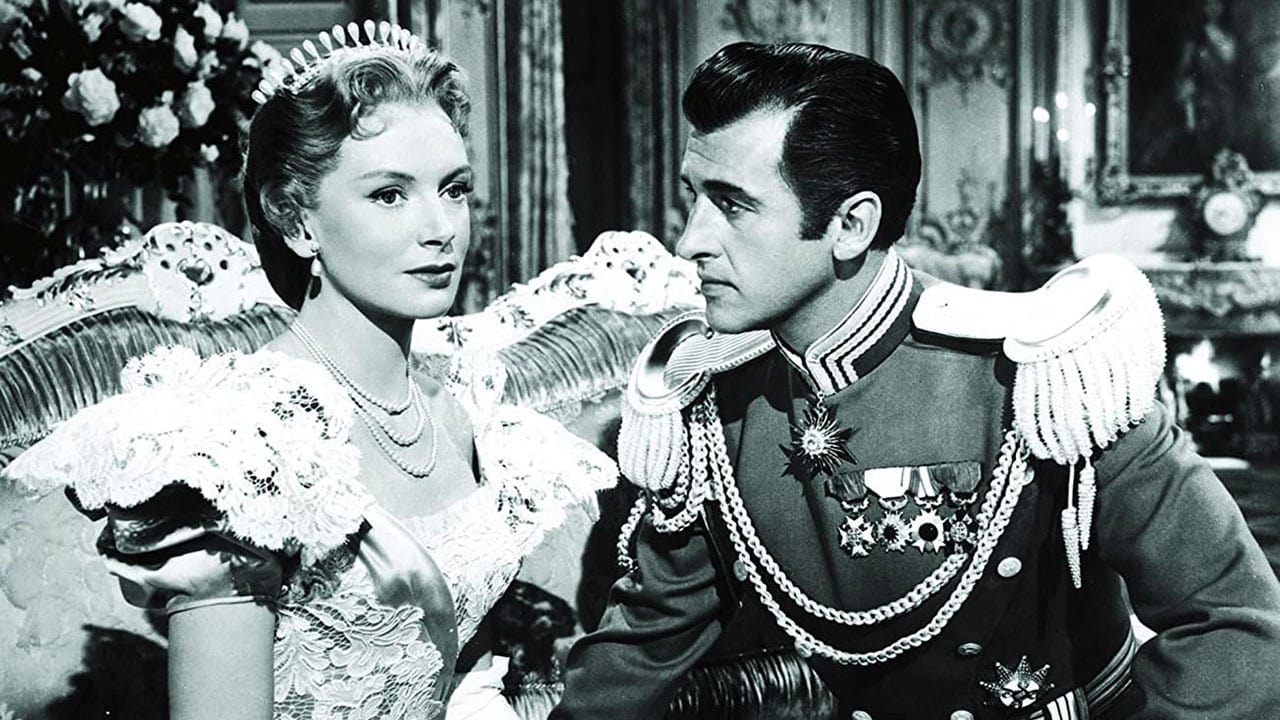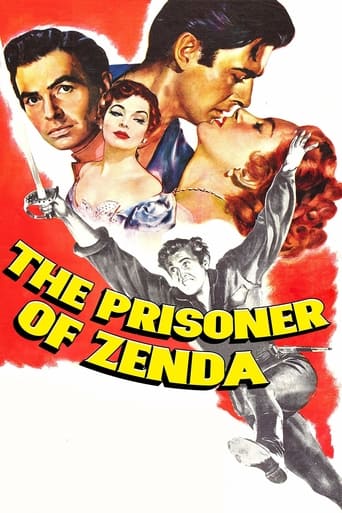

ridiculous rating
... View MoreHighly Overrated But Still Good
... View MoreThis movie was so-so. It had it's moments, but wasn't the greatest.
... View MoreI think this is a new genre that they're all sort of working their way through it and haven't got all the kinks worked out yet but it's a genre that works for me.
... View MoreThe plot - and this is valid both for movie and source material - contains enough corn, ham and cheese to feed the whole population of Indiana. It is also predicated on the remarkably daffy axiom that an English gentleman can handle any situation Fate throws at him, up to and including a solemn coronation as head of state of a foreign nation. (Listen, it's nice to have self-confidence, but a stiff upper lip and a talent for trout fishing will only carry you so far.) On the other hand there's a lot of wit and charm.This is a rousing and engaging adaptation, with a excellent cast giving excellent performances. I'm particularly fond of James Mason's suavely villainous Rupert, whose versatile and practical-minded cynicism could scare the socks off a Borgia pope. (I might be mistaken but I seem to remember that the book's Rupert is even scarier, as he is still a very young man, fully and consciously malicious at an age where most people are still trying to figure out how to order a pint.) But then, nobody could threaten like James Mason - the man practically turned it into an Olympic discipline.There's romance, mystery and comedy ; there's also some pretty decent fencing, as befits a classic swashbuckling adventure. Ah, they don't make them like that anymore !
... View MoreAn Englishman vacationing in a Ruritarian kingdom is recruited to impersonate his cousin, the soon-to-be-crowned king when the monarch is drugged and kidnapped.This version of "The Prisoner of Zenda" used the same shooting script as the 1937 David O. Selznick film directed by John Cromwell and starring Ronald Colman and Madeleine Carroll. Slight variations in the screenplay were added by Noel Langley. In addition to the dialogue, the same film score, composed by Alfred Newman for the 1937 version, was also used for this version. A comparison of the two films reveals that settings and camera angles, in most cases, are the same.Now, the consensus is that the 1937 version is the superior and definitive version. Typically, I agree with critics and tend to think older versions of films are generally better (though not always). On this one, though, I simply found the remake more engaging. The lead was more persuasive and I think there was just more emotion conveyed. It was more passionate than the original and this kept me far more interested.
... View MoreDirector Richard Thorpe's vigorous remake of the 1937 "Prisoner of Zenda, itself a remake of the 1922 silent "Prisoner of Zenda," boasts one major advantage over the classic Ronald Colman version, namely, four-time Oscar winning cinematographer Joseph Ruttenberg's dazzling Technicolor photography. Costume movies are the rare exception to the rule when it comes to color. They always look better in color. Stewart Granger is suitably heroic as the swashbuckling protagonist, and he seems more ideally cast as a leaping and lunging swordsman than Colman. Nothing against Ronald Colman but he seemed a little too old to be playing an athletic protagonist in the spirt of either Douglas Fairbanks, Sir., or Errol Flynn. Meanwhile, James Mason--incredibly enough--doesn't overshadow Douglas Fairbanks, Jr., in the role of amoral Rupert. Mind you, Mason later became a bigger star than both Granger and Fairbanks, but he seems more thuggish. Louis Calhern is just as good as C. Aubrey Smith, but Robert Douglas pales by comparison with Raymond Massey as Michael, Duke of Strelsau. Aside from these quibbles, this "Prisoner of Zenda" is essentially a scene-for-scene remake, with some variation incorporated in Thorpe's use of camera set-ups and pacing. If you see this version before you watch the 1937 version, you may prefer it simply because of the vibrant Technicolor. Deborah Kerr is definitely an asset as the Princess Flavia.
... View MoreOn the face of it, "The Prisoner of Zenda" has everything a swashbuckler could require to make it a glorious success: a star-studded cast with previous form, Technicolour pageantry, MGM production values, an Alfred Newman score, a classic story of self-sacrificing heroism... not to mention a setting that's not only generically but genuinely Ruritanian! But on viewing it again after a lapse of some years, I find that it still doesn't work for me; and there doesn't seem to be any obvious reason why.There were in fact *two* films released in 1952 starring Stewart Granger in sword-fighting heroics: one of them -- enchanting, bittersweet, dancing of wit and of blade, and featuring what was to become one of the most famous fight sequences in screen history -- was, of course, "Scaramouche". The other was "The Prisoner of Zenda"... and somehow, in every aspect that melded together to produce the classic that was its counterpart, it never quite catches up. Swashbucklers should spring lightly; this one has gloss, but a certain stilted air.Stewart Granger differentiates his dual roles admirably, to the extent that I caught myself becoming sceptical as to the actual resemblance between the two supposed doubles! His final duel is as athletic as any in his screen career, although the plot demands dogged defence rather than flashing brilliance; indeed, the outcome is refreshingly unconventional. However, I didn't find Rudolf Rassendyll to be one of his more memorable characters.It was James Mason, sporting an incongruous Prussian bullet-head haircut, who was the real disappointment for me. No stranger to charismatic villainy in the likes of "The Man in Grey", "Fanny by Gaslight" or "The Wicked Lady", he is here oddly lacking in Rupert of Hentzau's essential perverse charm, in what should have been a scene-stealing part. The other male characters are little more than one-dimensional down to Duke Michael's villainous limp, although Louis Calhern makes an upright Colonel Zapt.The women fare better. Deborah Kerr is sweet, fiery and entirely convincing as Princess Flavia, next in line to the throne, and Jane Greer is more than equal to the pivotal role of Antoinette de Mauban, whose complex motives prove the key to the whole plot.Ultimately, I found this a decent film, but not as outstanding as it should have been, given its constituent parts. It isn't the best work of any of the actors involved. I am reminded of Zoltan Korda's re-make of his own "Four Feathers" as the widescreen "Storm of the Nile": the story (and indeed in that case the script) is the same, but the spark is missing.Given the parallels, I must admit that I'm now very curious as to how the 1937 "Prisoner of Zenda" -- which I've never seen -- stands up in comparison! This one is a plush literary adaptation, but lacks the rollicking rapier-edge of laughter and daring that characterise the great classics of its genre.
... View More